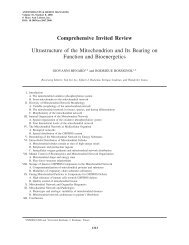MiPsummer Programme pdf - Mitochondrial Physiology Society
MiPsummer Programme pdf - Mitochondrial Physiology Society
MiPsummer Programme pdf - Mitochondrial Physiology Society
Create successful ePaper yourself
Turn your PDF publications into a flip-book with our unique Google optimized e-Paper software.
60<br />
Abstract # 30<br />
Characterization of complex III deficiency caused by myxothiazol administration in wild type<br />
mice<br />
Mina Davoudi 1 , Jukka Kallijärvi 2 , Sanna Marjavaara 2 , Eva Hanson, Per Levéen 1,2 , Heike Kotarsky 1 ,<br />
Vineta Fellman 1,2,3<br />
1 Division of Pediatrics, Department of Clinical Sciences, Lund, Lund University, Lund, 22185<br />
Sweden<br />
2 Folkhälsan Research Institute, Helsinki, 00029 Finland<br />
3 Children´s Hospital, Helsinki University Hospital, University of Helsinki, Helsinki, 00029 Finland<br />
A common cause of complex III (CIII) deficiency with liver disorder is mutations in the assembly<br />
factor BCS1L leading to depletion of Rieske iron sulfur protein (RISP) in CIII. We wanted to study<br />
the impact of RISP inhibition on the formation of respiratory chain complexes and supercomplexes.<br />
By administering myxothiazol to inhibit RISP in 5-6 wks old wild type mice (0.56 mg/kg body<br />
mass i.p 1- 5 times) we induced CIII deficiency for liver studies. Control mice were given saline<br />
with DMSO. After 24, 48, 72, and 74 h animals (n=3/group) were sacrificed and liver mitochondria<br />
isolated. CIII-activity was decreased to 50% of control. In the main supercomplexes, myxothiazol<br />
treated mice demonstrated increased amount of both complex III (containing RISP) and complex I.<br />
Free complex I was also increased. We conclude that myxothiazol induced CIII inhibition causes a<br />
compensatory increase of complex I and III content in the supercomplexes.



